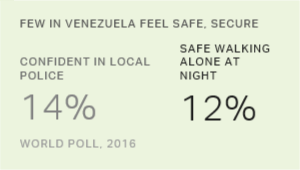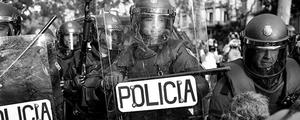Story Highlights
- New report shares Law and Order Index results for 135 countries
- Venezuelans least secure -- just 12% feel safe walking alone
- Singapore tops the world in security
WASHINGTON, D.C. -- Venezuela's score on Gallup's Law and Order Index -- its annual global gauge of how secure people feel -- continued to follow the country's descent into chaos in 2016. The country's index score of 42 out of 100 was the lowest in the world last year. This number is likely even worse now as the country's economic and political crisis deepens, including the election on Sunday that critics, including the U.S. and a growing list of nations, are denouncing as a "sham."
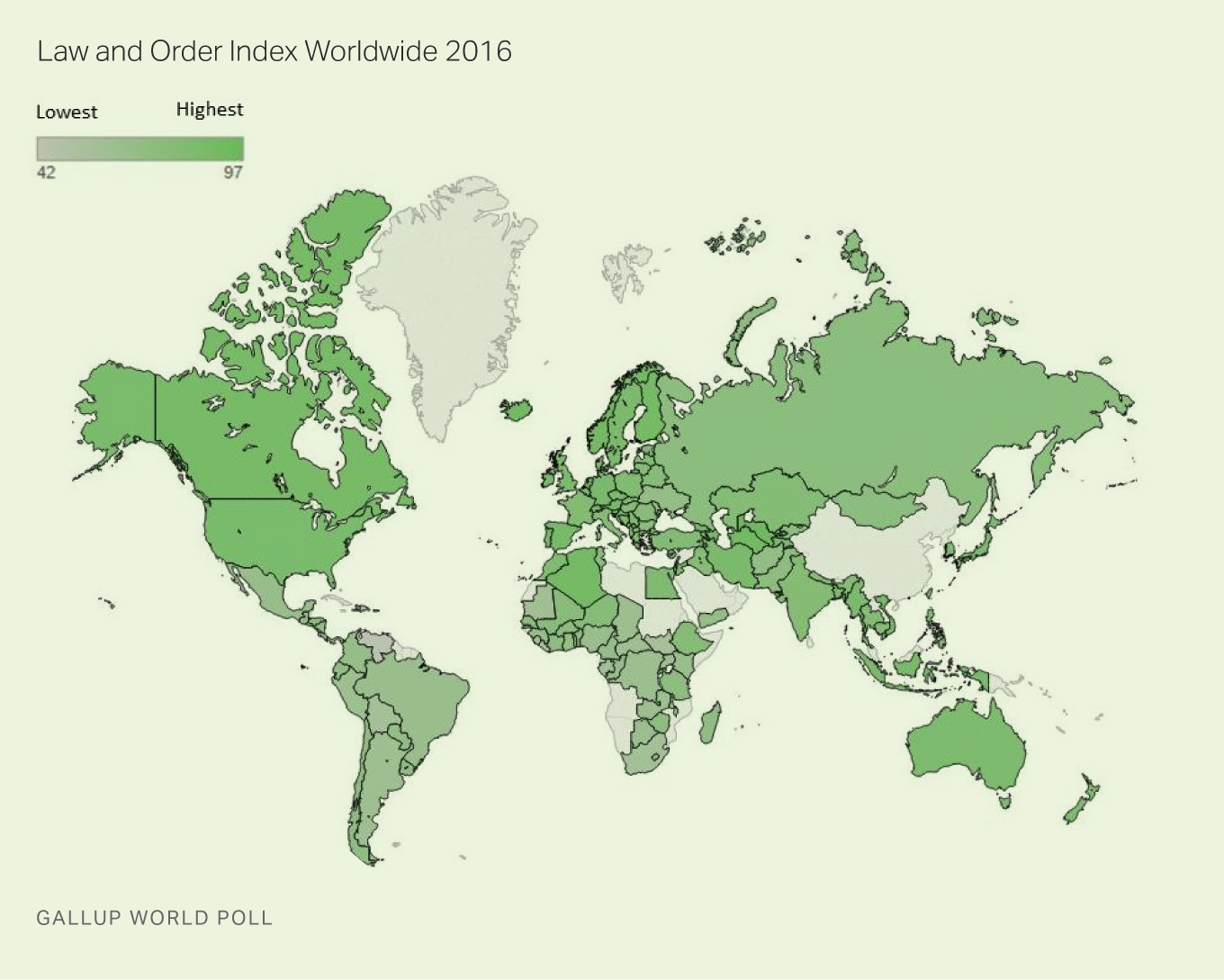
Across 135 countries, Law and Order Index scores in 2016 ranged from a high of 97 in Singapore to the low of 42 in Venezuela. The index is based on people's reported confidence in their local police, their feelings of personal safety, the incidence of theft in the past year and -- for the first time in 2016 -- the incidence of assault and mugging in the past year.
The changes in the index scoring in 2016 make it impossible to directly compare current index scores to those released in previous years. But if the 2016 data are scored without the assault and mugging question, Singapore still scores the highest in the world (97) and Venezuela still scores the lowest in the world (29). Venezuela has been no stranger to the bottom of the list -- it was the lowest-scoring country in 2013 and 2015, and second-lowest in 2014. Singapore has been at the top since 2013.
For the complete results for each country, read Gallup's 2017 Global Law and Order report.
Venezuelans' Sense of Safety, Confidence in Police Hit Record Lows
Venezuela's scores on all of the individual questions that make up the current index were worse last year than at any point in the past decade. Just 12% of Venezuelans in 2016 said they felt safe walking alone at night where they live, and 14% expressed confidence in their police. These are not only the worst on record for Venezuela, but the worst for any country last year -- and for the past 10 years.
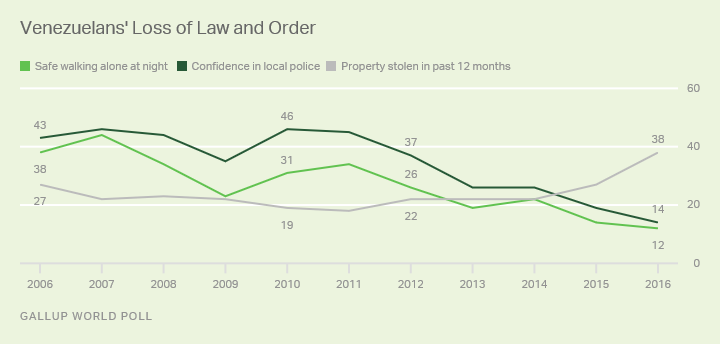
To put Venezuela's 12% who feel safe walking alone at night into perspective, the next-lowest figure in 2016 was more than twice as high as Venezuela: 28% in El Salvador. Among the 12 countries in which residents are least likely to say they feel safe walking alone at night, five are in Latin America. Another six are in sub-Saharan Africa -- including two of that region's more economically developed countries, South Africa (37%) and Botswana (38%).
| Least likely to feel safe* | Most likely to feel safe | ||||||||||||||||||||||||||||||||||||||||||||||||||||||||||||||||||||||||||||||||||||||||||||||||||
|---|---|---|---|---|---|---|---|---|---|---|---|---|---|---|---|---|---|---|---|---|---|---|---|---|---|---|---|---|---|---|---|---|---|---|---|---|---|---|---|---|---|---|---|---|---|---|---|---|---|---|---|---|---|---|---|---|---|---|---|---|---|---|---|---|---|---|---|---|---|---|---|---|---|---|---|---|---|---|---|---|---|---|---|---|---|---|---|---|---|---|---|---|---|---|---|---|---|---|---|
| Yes, feel safe | Yes, feel safe | ||||||||||||||||||||||||||||||||||||||||||||||||||||||||||||||||||||||||||||||||||||||||||||||||||
| % | % | ||||||||||||||||||||||||||||||||||||||||||||||||||||||||||||||||||||||||||||||||||||||||||||||||||
| Mauritania | 39 | Singapore | 97 | ||||||||||||||||||||||||||||||||||||||||||||||||||||||||||||||||||||||||||||||||||||||||||||||||
| Congo (Kinshasa) | 39 | Uzbekistan | 92 | ||||||||||||||||||||||||||||||||||||||||||||||||||||||||||||||||||||||||||||||||||||||||||||||||
| Argentina | 39 | Iceland | 88 | ||||||||||||||||||||||||||||||||||||||||||||||||||||||||||||||||||||||||||||||||||||||||||||||||
| Botswana | 38 | Norway | 87 | ||||||||||||||||||||||||||||||||||||||||||||||||||||||||||||||||||||||||||||||||||||||||||||||||
| South Africa | 37 | Rwanda | 87 | ||||||||||||||||||||||||||||||||||||||||||||||||||||||||||||||||||||||||||||||||||||||||||||||||
| Brazil | 36 | Slovenia | 87 | ||||||||||||||||||||||||||||||||||||||||||||||||||||||||||||||||||||||||||||||||||||||||||||||||
| Afghanistan | 36 | Hong Kong | 86 | ||||||||||||||||||||||||||||||||||||||||||||||||||||||||||||||||||||||||||||||||||||||||||||||||
| Liberia | 35 | Denmark | 83 | ||||||||||||||||||||||||||||||||||||||||||||||||||||||||||||||||||||||||||||||||||||||||||||||||
| Dominican Republic | 33 | Switzerland | 83 | ||||||||||||||||||||||||||||||||||||||||||||||||||||||||||||||||||||||||||||||||||||||||||||||||
| Gabon | 33 | Spain | 83 | ||||||||||||||||||||||||||||||||||||||||||||||||||||||||||||||||||||||||||||||||||||||||||||||||
| El Salvador | 28 | Armenia | 83 | ||||||||||||||||||||||||||||||||||||||||||||||||||||||||||||||||||||||||||||||||||||||||||||||||
| Venezuela | 12 | ||||||||||||||||||||||||||||||||||||||||||||||||||||||||||||||||||||||||||||||||||||||||||||||||||
| * In Syria, where residents were among the least likely worldwide to say they felt safe in 2015, security conditions prevented Gallup from conducting a survey there in 2016. | |||||||||||||||||||||||||||||||||||||||||||||||||||||||||||||||||||||||||||||||||||||||||||||||||||
| Gallup World Poll, 2016 | |||||||||||||||||||||||||||||||||||||||||||||||||||||||||||||||||||||||||||||||||||||||||||||||||||
At the same time, 38% of Venezuelans said they had had property or money stolen in the past year. This is up more than 10 percentage points from the previous year and a new record high for the country. Only five countries -- all in sub-Saharan Africa -- had higher percentages than Venezuela in 2016.
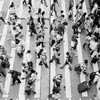
Shape your research with access to opinions across the globe.
Gallup conducts surveys in over 160 countries and 140 languages.
Venezuela is also among the 14 countries worldwide in which at least 15% of residents say they have been assaulted or mugged in the past year -- the new question included in the index in 2016. All but one of the 14 are in sub-Saharan Africa; the lone exception is Venezuela, where 22% say they have been assaulted or mugged in the past year. In a handful of these countries in sub-Saharan Africa, about one in four say they have been assaulted or mugged in the past year.
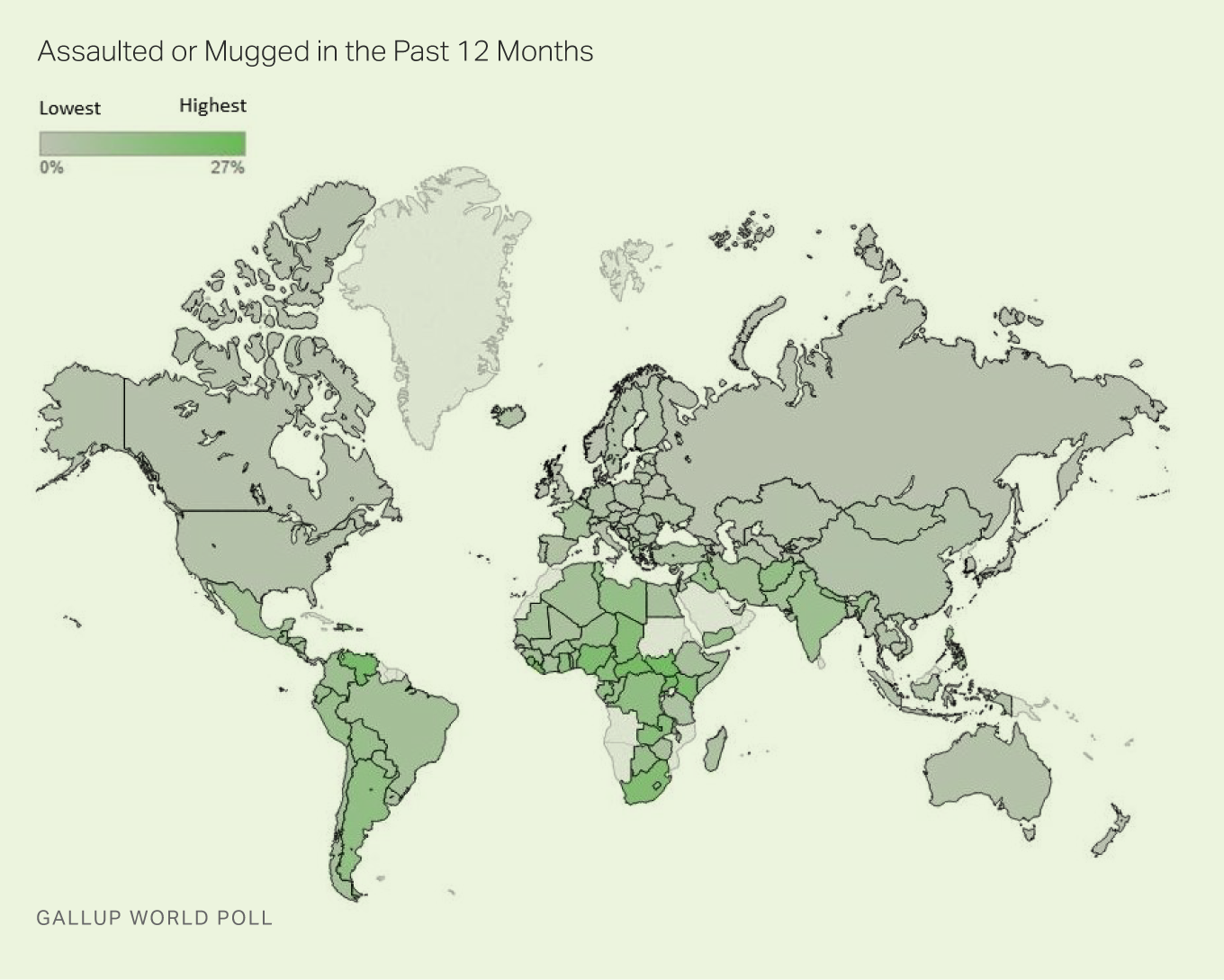
Latin America and the Caribbean Score Lowest on Security
Venezuela's scores continue to stand out even in Latin America and the Caribbean, where residents are the least likely among all global regions to feel secure in their communities. Latin America and the Caribbean scored a 64 on Gallup's Law and Order Index -- unchanged from its 2015 score. Residents of the U.S. and Canada, Southeast Asia, East Asia and Western Europe are the most likely to feel secure, with index scores of 84 or higher.
| 2015 | 2016 | Difference | |||||||||||||||||||||||||||||||||||||||||||||||||||||||||||||||||||||||||||||||||||||||||||||||||
|---|---|---|---|---|---|---|---|---|---|---|---|---|---|---|---|---|---|---|---|---|---|---|---|---|---|---|---|---|---|---|---|---|---|---|---|---|---|---|---|---|---|---|---|---|---|---|---|---|---|---|---|---|---|---|---|---|---|---|---|---|---|---|---|---|---|---|---|---|---|---|---|---|---|---|---|---|---|---|---|---|---|---|---|---|---|---|---|---|---|---|---|---|---|---|---|---|---|---|---|
| % | % | pct. pts. | |||||||||||||||||||||||||||||||||||||||||||||||||||||||||||||||||||||||||||||||||||||||||||||||||
| U.S. and Canada | 83 | 86 | +3 | ||||||||||||||||||||||||||||||||||||||||||||||||||||||||||||||||||||||||||||||||||||||||||||||||
| Southeast Asia | 85 | 85 | 0 | ||||||||||||||||||||||||||||||||||||||||||||||||||||||||||||||||||||||||||||||||||||||||||||||||
| East Asia | 82 | 84 | +2 | ||||||||||||||||||||||||||||||||||||||||||||||||||||||||||||||||||||||||||||||||||||||||||||||||
| Western Europe | 83 | 84 | +1 | ||||||||||||||||||||||||||||||||||||||||||||||||||||||||||||||||||||||||||||||||||||||||||||||||
| Middle East and North Africa | 79 | 82 | +3 | ||||||||||||||||||||||||||||||||||||||||||||||||||||||||||||||||||||||||||||||||||||||||||||||||
| Eastern Europe | 78 | 80 | +2 | ||||||||||||||||||||||||||||||||||||||||||||||||||||||||||||||||||||||||||||||||||||||||||||||||
| South Asia | 79 | 78 | -1 | ||||||||||||||||||||||||||||||||||||||||||||||||||||||||||||||||||||||||||||||||||||||||||||||||
| Commonwealth of Independent States | 74 | 76 | +2 | ||||||||||||||||||||||||||||||||||||||||||||||||||||||||||||||||||||||||||||||||||||||||||||||||
| Sub-Saharan Africa | 69 | 68 | -1 | ||||||||||||||||||||||||||||||||||||||||||||||||||||||||||||||||||||||||||||||||||||||||||||||||
| Latin America and the Caribbean | 64 | 64 | 0 | ||||||||||||||||||||||||||||||||||||||||||||||||||||||||||||||||||||||||||||||||||||||||||||||||
| Gallup World Poll, 2016 | |||||||||||||||||||||||||||||||||||||||||||||||||||||||||||||||||||||||||||||||||||||||||||||||||||
At the regional level, the 2016 Law and Order Index scores have remained relatively stable since 2015, changing no more than three points in any of the global regions. Scores for individual countries also changed little, with a few exceptions.
Implications
Venezuelans' falling scores on Gallup's measures of law and order are just one example of how their country has gone from one of the richest in South America to ruin in just a few short years. In fact, most aspects of Venezuelans' lives are worse now than they were before President Nicolas Maduro took office in 2013. In 2012, the majority of Venezuelans (57%) were thriving; that number stood at just 13% in 2016.
And, Venezuelans in 2016 were among the most likely in the world to report struggling to buy food their families needed -- with the 80% unable to afford food on par with populations in places such as Malawi and Central African Republic. In 2012, this percentage was just 27%.
No other country Gallup surveys has seen its people's ratings of their lives fall this far this fast in the past decade. And as bad as those ratings were last year, they are likely even worse now and not likely to get better soon. The latest violence and political turmoil will probably only make Venezuela's economic and humanitarian crisis worse -- the opposite of what Maduro says Sunday's election was designed to do.
Download the 2017 Global Law and Order report.
Survey Methods
Results are based on telephone and face-to-face interviews with approximately 1,000 adults, aged 15 and older, conducted throughout 2016 in 135 countries. For results based on the total sample of national adults, the margin of sampling error ranged from ±2.1 percentage points to ±5.6 percentage points at the 95% confidence level. All reported margins of sampling error include computed design effects for weighting.
